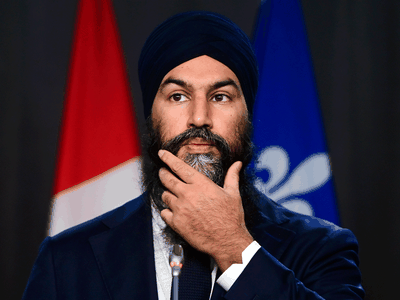Alex Dhaliwal
Published:July 15, 2021
-The Post Millennial
New Democrat leader Jagmeet Singh told reporters Wednesday that Parliament must tax the “ultra-rich” to pay for the pandemic.
Canada Revenue Agency figures for the 2017 tax year, the most recent available data, show of more than 27.8 million tax filers a total of 364,140 paid the top federal income tax rate of 33 percent on earnings of more than $202,800 a year. The majority of taxpayers, more than 18.4 million, earned less than $46,000.
“When it comes to how we pay for the recovery, how we pay for the pandemic, New Democrats believe we need to ask the ultra-rich to pay their fair share,” said Singh. “The reason why I say ‘fair share’ is because the ultra-rich have often hidden their money using offshore tax havens and loopholes.”
Singh said the Party would advocate for an “ultra-wealth tax” but did not elaborate.
“We actually believe in the fact that in this pandemic workers had to sacrifice a lot,” said Singh. “Small businesses were shut down and had to sacrifice a lot. You know who didn’t sacrifice? The ultra-rich.”
Of Canada’s top 100 highest-paid CEOs as calculated by Canadian Business magazine, four were paid more than $20 million that year: the chief executives of Valeant Pharmaceuticals International Inc., Magna International Inc., Rogers Communications Inc. and Macdonald Dettwiler & Associates Ltd. The periodical estimated another fifty-nine of the country’s wealthiest families each had assets of more than $2 billion.
“Make the rich pay,” Ken Neumann, then-national director for the United Steelworkers of Canada, said in May 20 testimony at the Commons finance committee. “My God, all of us, each and every one of us in this meeting here, we pay our fair taxes. Why shouldn’t the ultra-rich be in that same position? They all have to contribute. That’s what makes this country so great.”
New Democrats in the 2019 general election campaigned on a one percent equity tax on Canadians with assets valued at more than $20 million. Revenues would total $5.6 billion annually, according to a Parliamentary Budget Office report Net Wealth Tax. “A large behavioural response is expected due to avoidance,” wrote analysts.
In 2020, the Party also proposed a 30 percent tax on excess profits for large companies worth $7.9 billion, though it was never adopted. Singh called it a “pandemic profiteering tax” similar to a wartime Excess Profits Tax Act passed by Parliament in 1940. It imposed a minimum 35 percent levy on corporations with net earnings above their previous three-year average.
On June 29, Parliament passed into law Bill C-30 the Budget Implementation Act that imposed a ten percent luxury tax on six-figure automobiles, yachts and aircraft. Revenues are estimated at $604 million over five years, according to a Budget Office Costing Note.




